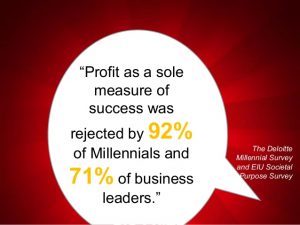
Among the many wonderful aspects of my position here at Sustainable Connections, one of the best is the opportunity to work with and learn from such bright business people. I am truly amazed at the wealth of knowledge we have in our community and the overall ethos of many businesses among us that are working hard to create better work environments and make positive contributions to our community. Every now and then conversations occur that spur ideas and needed shifts in perspective.
In a recent conversation with a business, I learned of their general reticence to promote and market all the great things they do in regards to sustainability. The response I received when I asked why was, “We do it for the right reasons, not for the promotion and marketing – we do not want to seem disingenuous.” Therein lies a common concern for businesses, a specter of accusations of greenwashing or taking advantage of sustainability to make something look good.
My response and suggestion is to change the lens in which we view sustainability in the business world. When you adopt sustainability as a core tenet of your business and what contributes to your success, why not treat it similar to all your other accomplishments. For example, businesses market and promote all sorts of good things they do–whether it is impeccable service, convenient hours, or phenomenal soups–and generally, they are not shy about it. Sharing your sustainability accomplishments can be an equally important aspect of your business and a competitive advantage. Numerous studies show that when given a choice between two products of equivalent value and performance, if one is more sustainable, consumers will choose the more sustainable option.
Research commis sioned by Unilever indicates there are good reasons to share your good deeds. The study of 20,000 consumers in five countries found 33% choose brands they believe are doing social or environmental good, while 21% say they would actively choose brands that made their sustainability credentials clearer on their packaging or in marketing. My guess is that in our area these percentages may be even higher. More broadly, Unilever said this data represents an untapped opportunity of around $1 trillion in sales for “sustainable goods.”
sioned by Unilever indicates there are good reasons to share your good deeds. The study of 20,000 consumers in five countries found 33% choose brands they believe are doing social or environmental good, while 21% say they would actively choose brands that made their sustainability credentials clearer on their packaging or in marketing. My guess is that in our area these percentages may be even higher. More broadly, Unilever said this data represents an untapped opportunity of around $1 trillion in sales for “sustainable goods.”
Sharing sustainability accomplishments offers other benefits to our community, too, which at first glance may not be readily apparent. One of those advantages is being a leader and setting a positive example for others. There are many businesses wanting to do more, wondering how, and are looking for success stories and ways to do so. When you share what you do in the realm of sustainability, not only do you benefit your business, you also benefit your community. My suspicion is your good deeds will spur many others! So, let us hear it, say it loud, and say it proud–What is your good deed?
